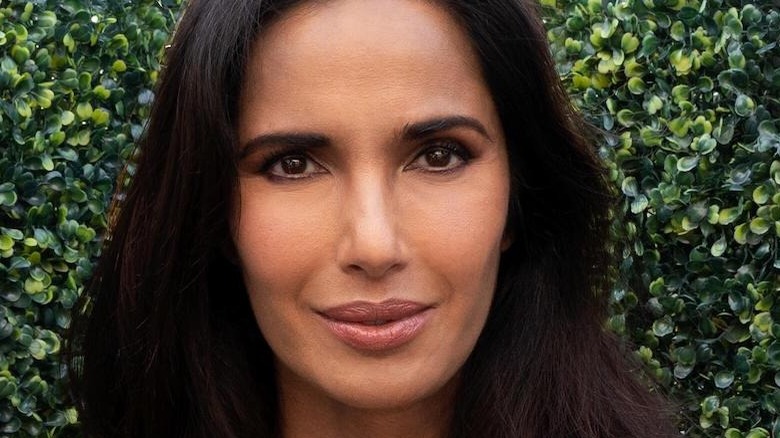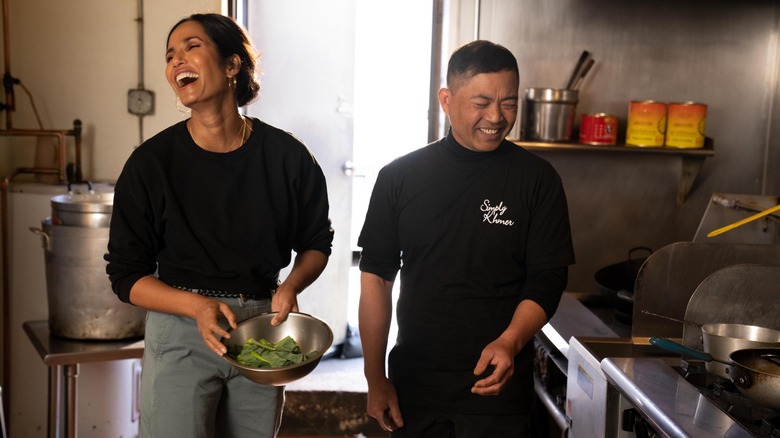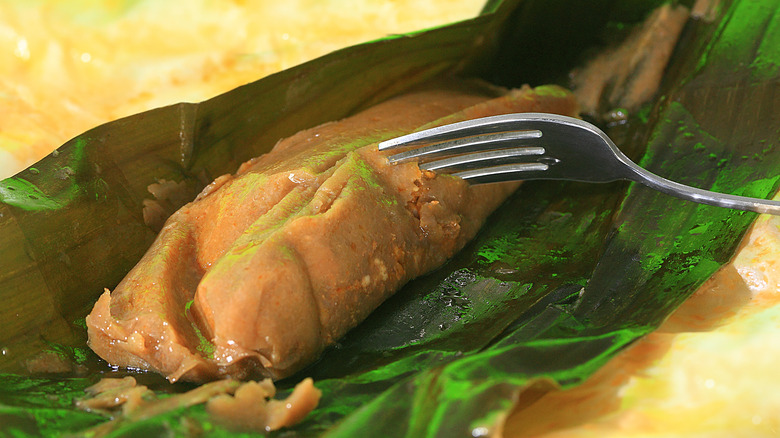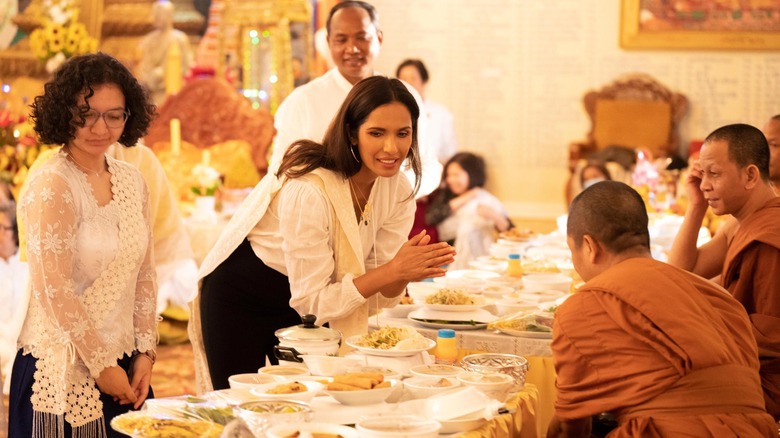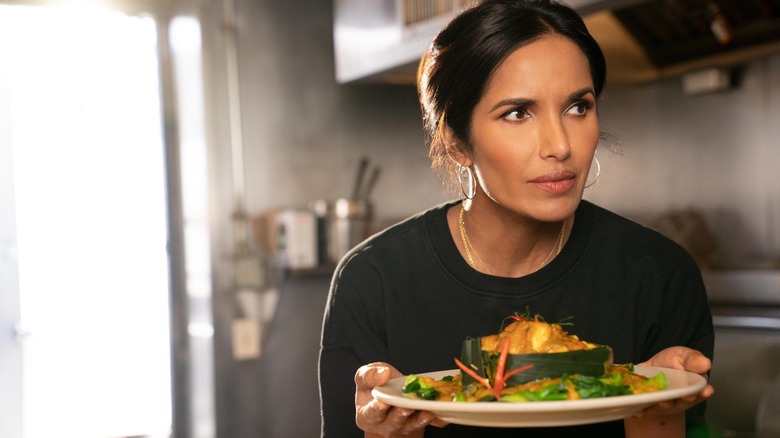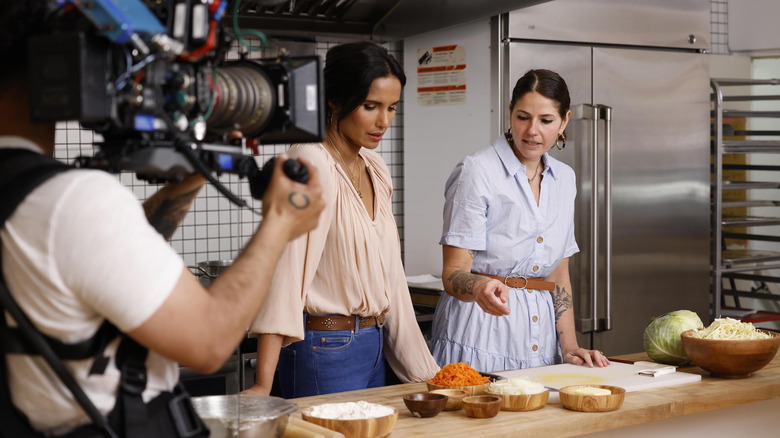Padma Lakshmi Celebrates America's Global Cuisine In Taste The Nation Season 2 - Exclusive Interview
Padma Lakshmi is a powerhouse in the food and media world. She's a writer, model, foodie, TV host, and activist. And now she's on a mission to teach America about itself through food. In 2020, Lakshmi created "Taste the Nation," an exploration of the diverse cultures that make up this country and what we can learn about the issues that divide us, all through the lens of delicious food — because at the end of the day, that's the one thing that can bring everyone to the table.
Now, "Taste the Nation" returns to Hulu with its 2nd season, featuring a range of culinary destinations across the country. From Puerto Rico to Houston to San Francisco to Washington, D.C., Lakshmi ventures across our rich culinary landscape from coast to coast, "ultimately uncovering stories that challenge notions of identity, belonging, and what it means to be American," according to its synopsis, and showing us along the way that there is more that unites us than divides us.
In an exclusive interview with Mashed, Lakshmi shared some of her favorite moments from the 2nd season of "Taste the Nation" and opened up about what she hopes people take away from the show, which is so much more than just a craving for a new dish.
Padma Lakshmi shares highlights from Taste the Nation Season 2
Just like with the 1st season, there's so much to learn from this season of "Taste the Nation" besides knowledge about food. What do you think are the biggest takeaways from Season 2?
I'm so excited for people to see it. ... In Puerto Rico, we talk about food sovereignty. There's so much to learn. In the Filipino episode, we talk about colonial mentality, which a lot of us immigrants have. In D.C., we talked to four different generations of Afghan immigrants, and we see how American foreign policy has heavily influenced that country. [We] talked to this one young, beautiful journalist who had to flee the country. She had a show on TV; she lost her whole life, and she was on one of those big cargo planes. And she was lucky enough to escape. ...
I went to Daly City to be with the Filipino community there, and I had to butcher a whole pig's head. I've never done that.
How was that experience?
You could see it all on my face. Let me just put it that way. I was glad I did it, though, because as a food writer, I should be able to do that stuff. It's part of my purview as a writer; I'm just not a chef, so I've never had to break down an animal. I'm glad I did it. I don't even know if it was on my bucket list, but it's a good one to check. I [also] learned to flatfoot and play the banjo in Appalachia. ...
There's so much in this season. I can't wait for people to see it. I learn so much every day myself during the research and everything else. ...
One of her favorite episodes explores the politics of Puerto Rico
One of my favorite episodes is when we go to Puerto Rico and demystify the whole connection between Puerto Ricans and Americans. A lot of people think Puerto Ricans are immigrants — they're not. They are American citizens. Puerto Rico is a territory, but things in Puerto Rico aren't that great, and that's because it's an American territory.
We use this beautiful dish called pasteles, and [there's] this big controversy about whether you're able to use ketchup or not. Even Puerto Ricans will fight amongst themselves, just like they fight about whether they should become a state so they have all of the rights of the mainland states, or whether they should stay the same, or whether they should be independent and be their own country. So that [issue of] ketchup [versus] no ketchup became a great metaphor for so much else that is way deeper and political.
There's also a lack of food sovereignty in Puerto Rico, and we talk about that. Puerto Rico is such a beautiful island. It should be growing food of its own 365 days a year. It should be exporting it. But there are laws that are still on the books that are made to benefit corporations, not citizens. That is what we're still suffering from. Now there's a whole new crop of young, hip, cool farmers that are bringing small farming back to Puerto Rico. We meet a lot of them.
Taste the Nation is focused on understanding immigrant communities
We go to Houston to talk with Nigerian Americans, and that episode is really moving because we also tackle Blackness in America. It's an important subject to talk about, and as somebody who's not African American, I wanted to make sure I did justice to that subject and I let them talk [and] tell me what it's like for them.
For Nigerians, it's really hard because they've come to this country and settled and had kids, and they didn't even know they were Black until they came here. Yet when they're out going about their lives in the world, all of that baggage of being African American is foisted on their shoulders. I speak to a lot of people about that.
I spoke to one chef. His name is Opoi Omoso. He has a great restaurant called ChòpnBlọk. He's Nigerian American and his wife is African American, and they're raising a child together. Navigating all of that is really interesting, to listen to how they do that. Also, the food is fascinating. I've traveled all over the world. I've never been to Nigeria, and I've never had fufu or egusi before. ...
I went to the Cambodian Americans in Lowell, Massachusetts. That episode is heartbreaking because it talks about refugees who came here with nothing but the shirt on their back. [They] completely revitalized the town and cleaned up the river and are even in local government. That episode is my answer to anybody who thinks we shouldn't let immigrants or refugees in, that they drain our economy. They don't drain our economy. Here is a great example. The property values had gone down so much. Storefronts were boarded up, and Cambodians came and resuscitated that town.
Food is a vessel for serious and impactful discussions on Taste the Nation
I'd love to get a little more insight about how you and your team decide the locations to go to. You mentioned Puerto Rico. [There's also] rural Appalachia, in a very conservative part of the country, and the Ukrainian hub in Brighton Beach. These are places that are very symbolic of political divides in America right now. Was that intentional?
It's intentional. The show is called "Taste the Nation" because it's a play on "Face the Nation," that weekend political show that we've all grown up with. We wanted to do an episode about Ukrainians because so many people in the West conflate Ukrainian culture with Russian culture.
We wanted to give context and a history lesson, and we do it through borscht, which is a dish that many people think is Russian. A lot of different cultures in Eastern Europe do make borscht; there's a hundred kinds of borscht, but the borscht we know, which is the red borscht made with beet, is specifically Ukrainian. But the first time I had it was at The Russian Tea Room. I thought it was Russian, too. That's a great episode because we also get to talk about antisemitism, both in Ukraine and here.
We pick our episodes based on a lot of things. I have a laundry list of places I want to go for various seasons, so my producing partner, David Smith, and I talk it over. We also talk it over with Hulu.
The show looks at immigration as this huge issue that is so integral to the foundation of America and its constant evolution as a superpower. With each episode, we don't just go in there, learn about the community, and then rinse and repeat in the next episode. We're looking at a different issue of this big puzzle that is immigration and trying to illuminate something.
I made a commitment to try and go to an indigenous community in every season, and we've managed to do that. In Appalachia, we talk to people from the Cherokee Nation who live on a boundary. I never knew what a boundary was. I didn't learn that in school, and I'm a product of the American public school system — I should have. A boundary is unlike a reservation in that the tribe owns their land. They had to buy it back from the U.S. government. I never heard that, and I should have.
Padma Lakshmi is learning and growing as the host of Taste the Nation
The people and the families that you talk to on "Taste the Nation" share very personal and very emotional experiences in front of a camera. How do you approach those conversations to get people to open up about such important issues, and how does food help build that bridge?
It's so difficult. I'm still learning on the job. I never interviewed people professionally before this, and no two interviews are alike. Many of these people have never been media trained. They've never had a camera in their face, let alone in their homes. I'm hugely indebted to all of our participants because they share such deep parts of themselves with us. There's a lot of crying. There's a lot of confession. There's a lot of opening up and making yourself vulnerable in such a raw way.
It affects me. I know how much my mother had to sacrifice to come to this country, and that's no different from the people I interview a lot of the time. I hope I'm meeting them where they are. The whole point of the show is to give my platform to others who don't normally see themselves in television or movies, all over the country, all of their lives, because that was the case for me growing up.
Even when I got on TV 20 years ago, for many years, I was the only Indian woman I saw on TV. There was Sanjay Gupta on CNN. That was about it. Now there's so many more South Asian people, and I'm so happy about that. I want to show people how diverse and how delicious America is and how we should celebrate that and not be afraid of it.
This interview has been edited for clarity.
Season 2 of "Taste the Nation with Padma Lakshmi" debuts today, May 5, on Hulu.
